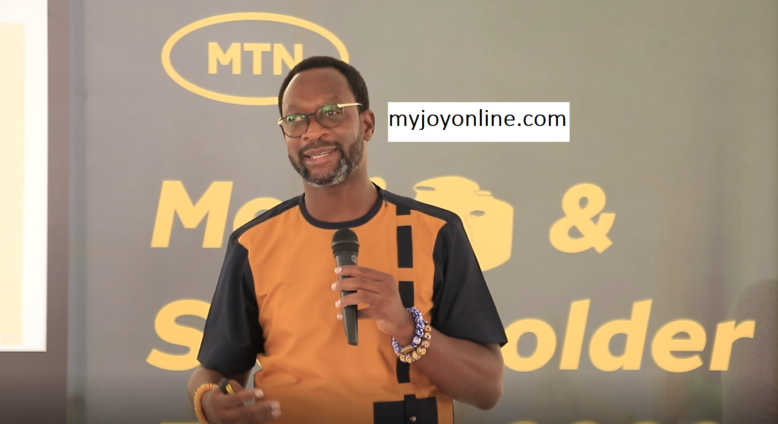Chief Executive of MTN Ghana has been explaining why cost of data still remains high despite the country being ranked third on the list of countries with cheapest data in Africa.
Selorm Adadevoh says the continuous consumption and reliance on foreign content, especially those from the United Kingdom and United States and the lack of infrastructure are some of the factors fueling the high cost of data in Ghana.
According to Mr. Adadevoh, about 90 per cent of downloaded content in Ghana originates from the UK, US, and other parts of the world at an exorbitant 320 gigabits per second.
Some concerned Ghanaians recently launched a campaign against what they described as high internet charges.
Under the hashtag 'DataMustFall', protesters complained that the cost of data remained high despite a reduction in Communication Service Tax on September 15, 2020.
The concerned Ghanaians whilst sharing their internet usage cost experience on social media platforms such as Twitter, Facebook, LinkedIn, among others also tagged their internet service providers.
Nana Yaw, a student is one of the protesters who wants cost of data reduced.
“I spend 8 or 10 Ghana cedis on data daily. Data shouldn’t be that expensive. At least, there should be giveaways from service providers and the package should include free data.”
But speaking at a meeting with News Editors in Kumasi, Mr. Adadevoh explained why the cost of data is still high.
“Most of our contents come from US, UK but either way if you take our contents that come from outside of Ghana, its over 90 per cent. It’s a lot of our contents.
"But if the content is not here, then you have to go through undersea cables; which are cables that take us under the sea. Ghana is connected through different countries in the world to bring content back and it’s very expensive”
“What do you think will happen if a lot of contents was in Ghana? We won’t need 320 gigabits per second. Which means we won’t pay for 320 gigabits right?
"So what do you think would happen to the cost of data? It would be cheaper.
Someone say Ghana you are expensive let’s compare to America; let’s compare to the UK and they will do all analysis. But what they forget is that in the UK, they consume content that is in the UK. In the US, they consume content that is in the US. These guys have over 300,000 kilometers of fiber. Fiber is also cheaper.
"When you have fiber all over the country, you can transmit a lot of data very cheaply on that one cable. So these are all the things that contribute towards data and why it may not be as affordable as we would like.
"But you know, if you think about Africa, Ghana is probably number 3 in terms of cheapest country for data.” Mr. Adadevoh added.
There is however hope for Ghanaian data consumers and internet users.
According to Mr. Adadevoh, consumption of local content can help bring down the cost of data in Ghana.
It is in this light that he has hailed Chenosis, a pan-African Application Programming Interface market place that enables developers and businesses to discover and subscribe to the largest library.
Content developers can easily tap into a broad spectrum API products and services, ranging from telecommunications, e-health, e-government, fintech, e-commerce, among others in Africa.
They can identify, authenticate, make payments and collections from a single marketplace.
Mr. Adadevoh explains.
“If we consume content locally, we won’t need all those resources that we pay for today and therefore our cost of data would be cheaper.
But again, once we are able to support through platforms like Chenoisis (Marketplace) where small enterprises can build more local content so people can consume, all of these things are geared towards localization for local consumption.
If we can improve that, then we can continue to accelerate the improvements in pricing data as we go forward.”
Latest Stories
-
Residents commend MTN for community engagement, call for continuous service improvements in Tsito
12 minutes -
Al-Azhariya Islamic cluster of schools in deplorable state: Teachers call for renovation
14 minutes -
France urged to address colonial legacy as Senegalese activists call for reparations in Dakar Roundtable
17 minutes -
“Eat AI, drink AI, live AI” – UG Professor
19 minutes -
Direct Relief applauds Breast Care International for lifesaving medical support in Ghana
20 minutes -
“A cultural force and national treasure” – Tourism Minister pays tribute to late Daddy Lumba
20 minutes -
Kufuor mourns Highlife icon Daddy Lumba: “A thunderbolt to the nation”
21 minutes -
Hindsight: Zito’s Kotoko era begins with a blast from the past
28 minutes -
Prosper Ogum appointed Black Starlets boss and GFA head of coaching education
32 minutes -
NSMQ 2025: Prempeh College into Ashanti Zonal semis, chasing first title since 2021
43 minutes -
“A true professional and musical gem” – Appietus pays tribute to Daddy Lumba
44 minutes -
Mahama pledges tax waivers on agro-processing machinery, boost for local fabrication sector
1 hour -
‘Mahama has no interest in Bawku conflict’ – Edudzi Tamekloe
1 hour -
15 members of Obogu Saviour Church Youth Ministry perish in a gory accident at Juaso
1 hour -
Newborn baby found dead at refuse dump at Diabaa
2 hours

